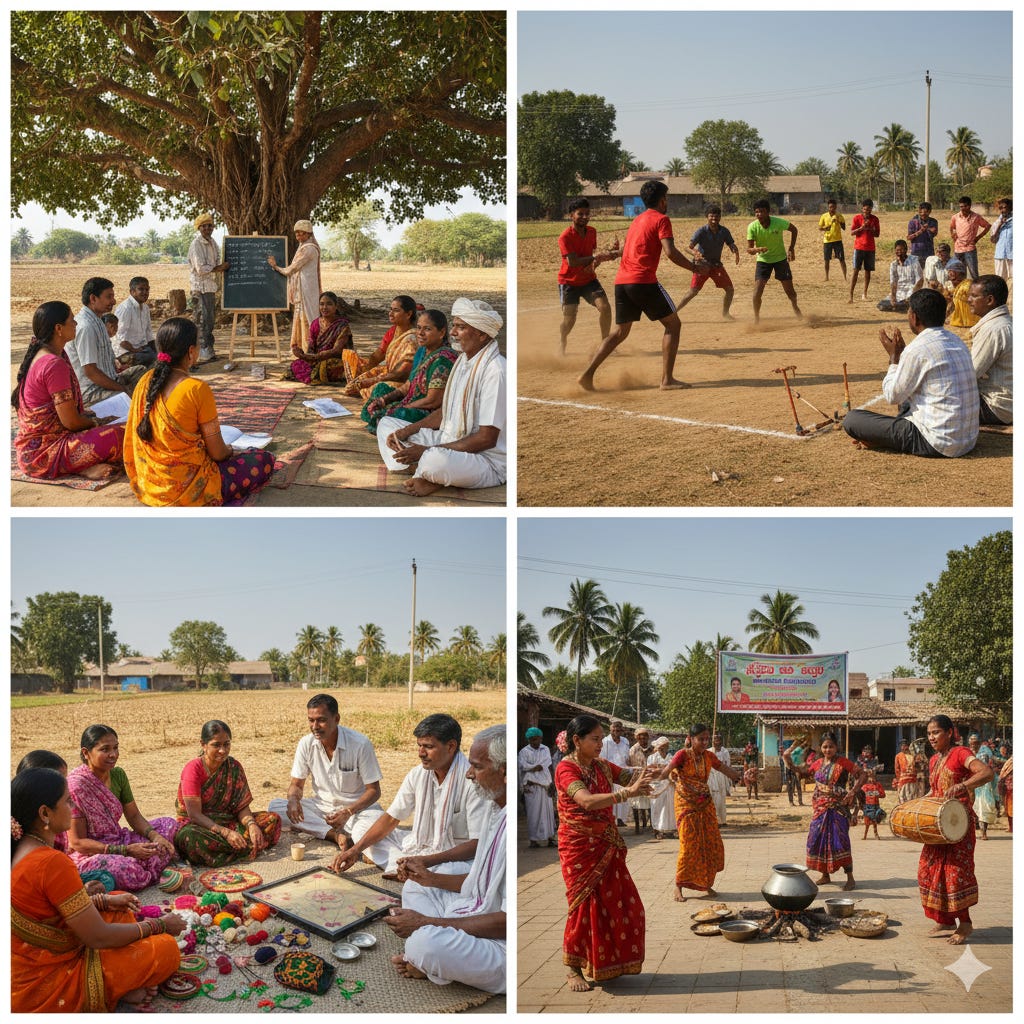How Cash Transfer in Telangana is Changing Farmers’ Use of Time
Telangana’s farm cash transfer shows welfare can be judged by how families spend their hours, not only their incomes.
View as PDF
Sonna Vikhil, Madras School of Economics
K. S. Kavi Kumar, Madras School of Economics
SDG 8: Decent Work and Economic Growth | SDG 10: Reduced Inequalities
Institutions: Government of Telangana | Ministry of Agriculture & Farmers’ Welfare
For decades, Indian farm policy has revolved around fertiliser subsidies, loan waivers and input support. Telangana chose another path: unconditional cash, deposited each season directly into farmers’ accounts. Launched in 2018, the Rythu Bandhu scheme (now Rythu Bharosa) is the country’s first large-scale experiment with direct transfers in agriculture.
The sums are significant – now ₹12,000 per acre annually, consuming close to 5-7 percent of the state’s budget. But the larger story is not fiscal. By steadying household incomes, the programme is reshaping how farming families spend their most limited resource: time. That reallocation, more than the money itself, is what makes Rythu Bandhu a model worth closer examination.
How Farmers Spend Their Day
A farmer’s day is divided between field work, domestic chores, caring for children and elders, community life, leisure, and the basics of eating and resting. How those hours are apportioned says as much about well-being as income does.
Time Use Surveys by the National Sample Survey Office in 2019 and 2024, which track activities in half-hour slots offer a revealing picture. In the early years of Rythu Bandhu, in 2019, individuals receiving cash devoted more time to agricultural work by 8.6 percent and to self-care, while cutting back on unpaid chores and leisure by 14 percent and 8.8 percent, respectively. An increase in time spent on work is a phenomenon observed in the developing and under-developing countries, where cash transfers ease credit constraints, thereby enabling beneficiaries to invest in productive activities, which may lead to an increase in the time spent on labour supply and alter time allocation decisions.
By 2024, the rhythm had changed. Beneficiary households spent about 8.3 percent less of their day on farm work, and devoted about 17.7 percent more to leisure, learning, and social life relative to the non-beneficiaries. With predictable income secured, the initial surge of labour gave way to a redistribution of hours toward learning, sports, leisure, and community life. This pattern illustrates a classic economic idea: rising incomes allow households to trade some labour for leisure or learning. Telangana confirms the principle but shows it unfolds in stages – first more work, then more balance.
Global Lessons
From Mexico to Malawi, cash transfers have redefined welfare debates. In Latin America, conditional schemes tied to school enrolment or health visits improved human capital. In Africa, unconditional transfers often expanded leisure but also improved nutrition and community investment. Outcomes varied with transfer size, conditionalities and cultural context.
Telangana contributes an Indian chapter to this story. Its trajectory – first a burst of labour, then a turn towards balance – demonstrates that families do not simply consume more when cash arrives. They reorganise their time in ways that strengthen learning, social networks and community life, dimensions long neglected in agricultural policy.
Who is Left Out
Design choices matter as much as outcomes. Rythu Bandhu covers all registered landowning farmers, regardless of acreage. A farmer with ten acres receives ₹1.2 lakh annually. Yet, tenant farmers and the landless, often the poorest, remain outside its ambit. In Telangana, tenancy surveys suggest that nearly 35 percent cultivators are tenants and of whom 6.7 percent are landless. Thus, leaving them outside the safety net is a concern, even as nearly six million landowning farmers receive support. Lately, the Government of Telangana has started mulling on including landless tenant farmers in the ambit but the story is far from over. The reason is structural: The Hyderabad Tenancy and Agricultural Lands Act of 1950 restricts recognition of tenancy, making it legally impossible to extend benefits to sharecroppers.
The result is a paradox. The scheme thus stabilises agriculture while bypassing those who labour without titles. If India ever contemplates scaling up unconditional transfers nationally or regionally, tenancy reform will be unavoidable.
The Burden on Women’s Time
Exclusion across households is mirrored by inequality within them. Across rural India, women already spend nearly five hours a day on unpaid domestic and care work – about three times as much as men. With additional income, men often reduce labour or claim more leisure, while women’s workload stays constant.
Evidence from other countries echoes this pattern: cash transfers can inadvertently expand women’s unpaid responsibilities as men retreat from them. Telangana highlights the need for gender-responsive design: pairing income support with childcare facilities, community kitchens or campaigns for more equitable sharing of chores. Without such measures, progressive schemes can inadvertently entrench inequality.
The Fiscal challenge
Generous transfers have a price. Rythu Bandhu absorbs about 5 to 7 percent of Telangana’s budget, inevitably crowding out other priorities. Yet, the scheme has survived and even expanded across election cycles, because farmers value the security it provides amid prices and uncertain monsoons as much as any immediate productivity gain.
The challenge is balance. Cash transfers ease liquidity constraints but cannot address structural bottlenecks in farming – whether micro-irrigation, infrastructure or input access. They stabilise households but do not, on their own, build canals, roads, or hospitals. Their greatest value comes when combined with public investment in such goods, which expand the productive frontier. Their true worth lies in complementing public investment in these goods, cushioning volatility while infrastructure and services raise long-term productivity.
Welfare - Redefined
The deeper lesson is that welfare must be judged not only by rupees earned or crops harvested but also in hours lived. If cash support allows a farmer to work less without fear of hunger, to attend a community gathering, or to allow a child more time to study, those are genuine improvements in quality of life.
Development, in this light, is not simply about producing more. It is about enabling families to live better – through rest, learning, social bonds and dignity. Well-designed cash transfers expand precisely that freedom, given, they do not create negative incentives for paid work.
The Policy Lever
Telangana’s experiment points to clear imperatives. Income support should be judged not only by its financial effect but also on how it reshapes time. The exclusion of landless tenants must be addressed promptly if programmes are to be equitable. Gender dynamics too demand deliberate attention, lest progress for households conceal setbacks for women.
None of this takes away from the achievement. Once survival is less precarious, rural families do not squander support; they seek balance, knowledge and connection. Rythu Bandhu has become more than a fiscal transfer; it affirms that farmers’ welfare depends not only on material well-being but also on non-material aspects such as time for life.
As India debates the future of welfare, the crucial question is not whether to pay farmers, but whether those payments allow time for them to live better.
View as PDF
Authors:

The discussion in this article is based on the authors' working paper on the subject. Views are personal.


